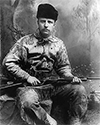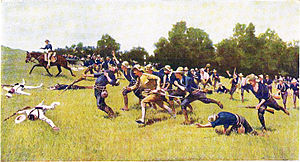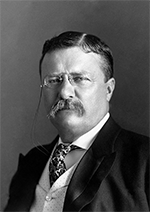President Theodore Roosevelt
Theodore Roosevelt was President of the United States, a war hero, and a larger-than-life public figure who dominated the American political stage for more than two decades. He was born on Oct. 27, 1858, in New York City. His father, Theodore Roosevelt, Sr., was a successful business owner. Young "Teedie," as He enjoyed studying science and was fond of taxidermy. A prodigious reader, he was a good writer as well. At Harvard College, he served as editor of the Harvard Advocate and was a member of the literary society. He graduated from Harvard College in 1880 and married Alice Hathaway Lee. Roosevelt attended Columbia University Law School for one year and then left to be a public servant. In 1882, when he was just 23, he won election to the New York State Assembly. He served two terms there.  Alice, his wife, and Martha Roosevelt, his mother, both died on the same day, Feb. 14, 1884, and Roosevelt retired from public life to grieve, spending two years on a ranch in the Dakota Territory's Badlands. While he found work as a cowboy and a cattle rancher, his sister looked after his infant daughter, who was named after his wife. Young Alice had been born just days before her mother died. Roosevelt returned to New York in 1886 and ran for mayor. He did not win. He then married again, to Edith Carow; they had known each other since they were children. The couple eventually had five children together (Theodore, Jr.; Kermit; Quentin; Ethel; and Archibald), and they also reared his daughter Alice. President Benjamin Harrison in 1888 appointed Roosevelt to the U.S. Civil Service Commission. President Grover Cleveland again named Roosevelt to that commission. The New York City Board of Police Commissioners named Roosevelt its president in 1895. He then achieved his highest-ranking appointment so far, when in 1897 President William McKinley named him Assistant Secretary of the Navy.  Roosevelt was instrumental in bulking up the Navy and, after the Spanish-American War began, saw combat himself, as a colonel in the First U.S. Volunteer Cavalry, known as the "Rough Riders." His role in achieving a hard-fought victory at the Battle of San Juan Hill made him a hero back home, and he rode that popularity to victory in the New York mayoral election of 1898. McKinley named Roosevelt his running mate during the presidential Election of 1900, and the pair won that election. During the campaign, Roosevelt traversed the country, speaking in 24 states on behalf of McKinley's re-election. The result was a hardy victory for the Republican incumbent. McKinley was shot on Sept. 6, 1901, and died eight days later. Roosevelt became President. At 42, he was the youngest U.S. President yet, just as he had been the youngest ever to be elected to the New York State Assembly. The new leader promised a government philosophy and set of programs known as the Square Deal, emphasizing fairness and equality over naked capitalism. He made headlines as a trust-buster, enforcing the Sherman Antitrust Act against the Northern Securities Company–making an enemy of powerful financier J.P. Morgan in the process–and also lent the weight of the Oval Office to stop a Pennsylvania coal strike by winning for the striking miners a rise in salary. Continuing a theme that had driven his political career, he railed against political corruption, using the power of his office, which he called the "bully pulpit," to raise awareness of predatory business practices. Roosevelt won re-election in 1904, easily defeating the Democratic candidate, Alton B. Parker. Roosevelt considered his strong showing a mandate to continue in his anti-corruption campaign, and he did so, lending voice to the concerns raised by investigative journalists known as "muckrakers," who made a point of highlighting unfair and dangerous working conditions in several American industries. One of the more well-known of those was the meatpacking industry. Roosevelt lent his influence to the passage of the Pure Food and Drug Act and the Meat Inspectioin Act. Returning to the railroad industry, Roosevelt also, through the passage of the Hepburn Act, succeeded in beefing up the oversight powers of the Interstate Commerce Commission with regard to stopping price gauging on rail travel. 
He was a strong presence on the international stage, spearheading the construction of the Panama Canal (which he visited in 1906, becoming the first U.S. President to leave the country while in office) and issuing the Roosevelt Corollary to the Monroe Doctrine, to protect Caribbean and Latin American nations from European domination. In the latter, he demonstrated his maxim of "Speak softly and carry a big stick." In the same way, he sent the Great White Fleet, a collection of powerful ships from the U.S. Navy, on a world tour to demonstrate American might. Roosevelt also negotiated the peace that ended the Russo-Japanese War, which earned him the Nobel Peace Prize. Largely because of his insistence, Congress created the Forest Service in 1905. He signed into law bills that created five National Parks and 18 National Monuments (among them the Grand Canyon), protecting nearly 200 million acres from development, enabling the creation of forests, reserves, and wildlife refuges. He also oversaw the introduction of more than a dozen irrigation projects. Next page > World Statesman > Page 1, 2 |
|
Social Studies for Kids
copyright 2002–2026
David White



 his family called him, suffered from asthma and other ailments as a child. He had bad eyesight and wore glasses for most of his life. As he grew, he crafted a physical regimen to strengthen his body and immune system, including among other activities boxing, gymnastics, and weightlifting.
his family called him, suffered from asthma and other ailments as a child. He had bad eyesight and wore glasses for most of his life. As he grew, he crafted a physical regimen to strengthen his body and immune system, including among other activities boxing, gymnastics, and weightlifting.

